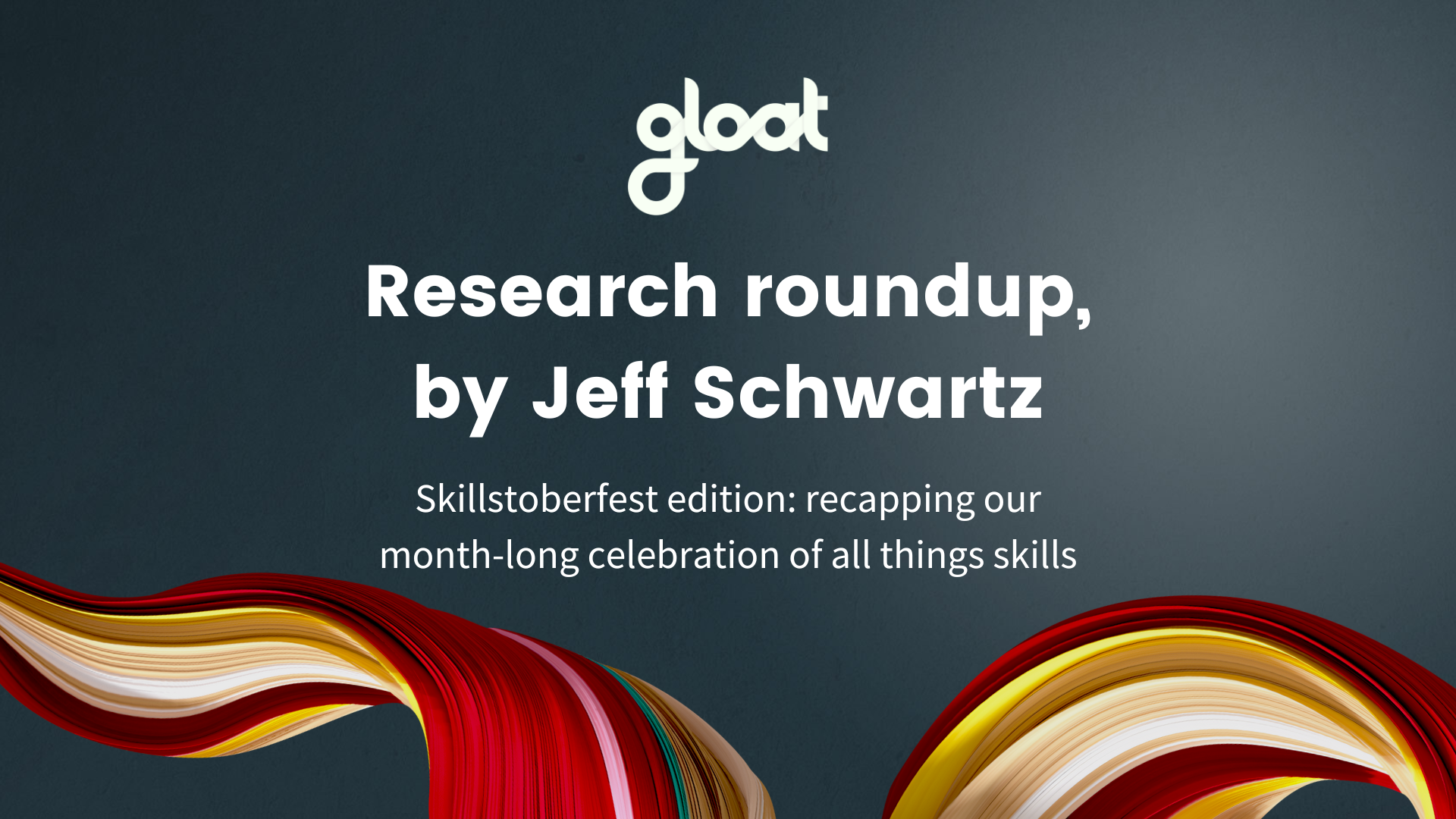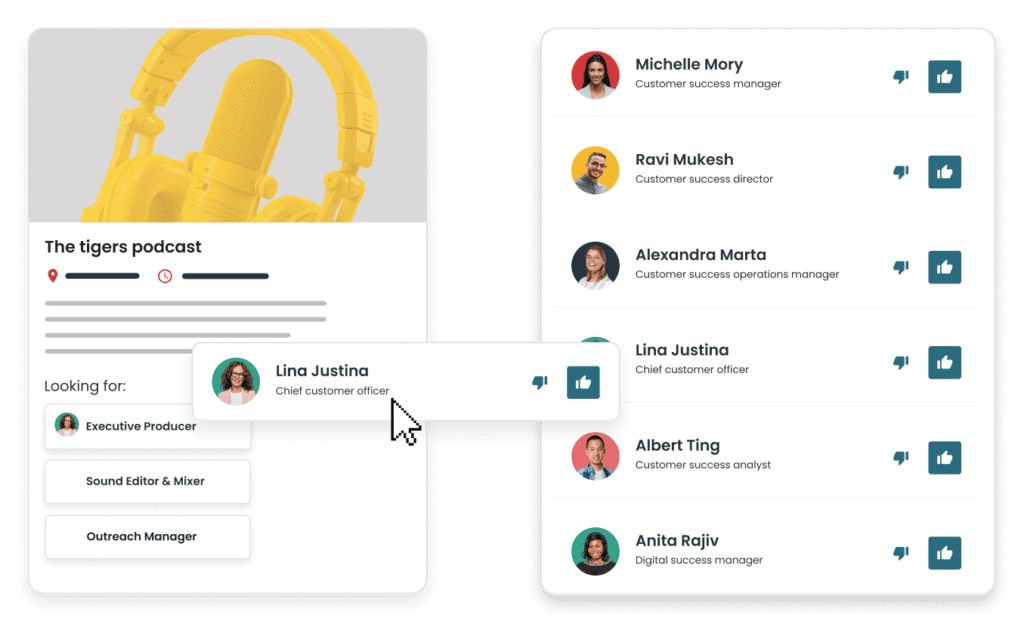Skillstoberfest research roundup

What I am reading, listening to, and thinking about in the world of skills
If you follow the work we’re doing here at Gloat, you’re probably familiar with Skillstoberfest: a month-long celebration of the shift more and more organizations are making away from job-dominant operating models and towards skills-based approaches that drive productivity, innovation, and employee engagement.
We timed this initiative to coincide with Oktoberfest and I’d argue that we couldn’t have picked a more important moment to focus on skills and share ideas, insights, and strategies that will help organizations progress and accelerate their skills journeys. The spotlight on skills-based organizations continues to brighten, particularly as businesses brace for the changes that AI innovations are setting into motion. Every organization will not only need to build new skills to successfully take advantage of AI-powered tools; they will also need to evolve their talent strategies to dynamically flow employees to open opportunities based on their skills and aspirations.
The message that skills are both the foundation and catalysts for successful work and people strategies was echoed at UNLEASH World in Paris in mid-October when Josh Bersin and Gloat unveiled our Dynamic Organization report. Our research reveals what top-performing companies do differently: prioritizing skill-building and skills initiatives emphazing mobility and growth through strategies and governance, and technology and insights were overarching themes these organizations shared. We also heard from Markus Graf, Global Head of Talent at Novartis, about the pivotal role that AI-powered tools play in their shift to becoming a skills-based organization and the critical role of talent markets and talent matching.
While Skillstoberfest is coming to a close (and we’ve sipped our final Skillsners), this fourth quarter of 2023 is a critical time for leaders to not only reflect but to take action before the end of the year to make progress on their skills journey and to achieve the business and people results we talk about in the Josh Bersin Company report on Dynamic Organizations.
In this research roundup, I’m highlighting some of the most eye-opening content that all leaders should keep top of mind as they launch and navigate their own skills journeys. From research that highlights the key elements of winning skills strategies to an interview with a data scientist who created Gloat’s skills intelligence tool, this roundup includes a range of podcasts, articles, and research that explores the range of elements of skills-based transformation and can help business and HR leaders and program managers make progress in the coming months and year.
REFLECT As we end the Skillstoberfest month, I’m starting this roundup with a “classic” essay based on a speech that John Seely Brown (known as JSB)—one of my mentors when I was a partner at Deloitte and the former head of research Xerox Parc—presented in 2015 to graduating students at Arizona State University
The Endless Possibilities of the Whitewater World, The Aspen Institute, by John Seely Brown: In the spring of 2015, JSB described what it is like to live and grow in a whitewater world where we are called upon to be “more like a whitewater kayaker who skillfully reads the currents and disruptions of the context around us,” and shift from being to students to entrepreneurial learners and doers. Writing more than eight years ago, JSB observes that “This is a different world—a world where skills matter, tools matter, but expertise and authenticity are also required. It’s a world with powerful tools galore [and he’s writing this half a dozen years before GenAI and ChatGPT], and immense opportunities available only if you are willing to unleash your powerful imagination and invoke your skills.” For us at Gloat, Skillstoberfest is a celebration and a departure point to understand the changing role of skills, work, and talent and skills marketplaces. JSB’s essay is a great way to reflect on the journey and what is ahead.
READ What’s new in thought leadership about skills and the future of work
Reskilling in a Rapidly Changing World, Boston Consulting Group, by Sagar Goel and Orsolya Kovács-Ondrejkovic: Now that the average half-life of skills is less than five years, organizations need a new approach to reskilling their workforce. In collaboration with Harvard’s Digital Reskilling Lab, Boston Consulting Group has identified five factors that organizations need to address to thrive in this rapidly changing era of automation and AI: 1) Reskilling is a strategic imperative 2) Reskilling is the responsibility of every leader and manager 3) Reskilling is a change management initiative 4) Employees want to reskill when it makes sense 5) Reskilling takes a village.
How skills-based training can build the workforce of the future, Big Think, by Joanne Willard: Most leaders know that their workforce will need to evolve and adapt to prepare for future challenges. In this article, Joanne Willard explains why skills-based training is one of the essential paradigm shifts that all organizations will need to embrace to thrive in our fast-paced working world. She cites some key statistics that underscore the importance of today’s shift to skills-based strategies, including the World Economic Forum’s prediction that by 2025 50% of all workers will need reskilling to keep up with technological advances and McKinsey’s finding that 87% of executives are already experiencing skill gaps.
Why You Should Build a “Career Portfolio” (Not a “Career Path”), Harvard Business Review, by April Rinne: We can’t celebrate Skillstoberfest without acknowledging how career development will change as a result of this skills shift. As organizations begin reallocating talent to opportunities based on their capabilities, rather than job descriptions, employees will be able to build rich portfolios of professional experiences that are multi-dimensional—in turn leaving traditional, vertical-only career ladders behind. This Harvard Business Review article explores why this new portfolio approach to career development is a superior option, both for businesses and the people who work for them.
How to Build a Skills-Based Organization: 10 Steps for HR, BrianHeger.com, by Brian Heger: Everyone’s talking about becoming skills-based—but actionable insights on how to embrace skills-centric operating models are harder to come by. By breaking down the skills transformation into ten steps, Brian Heger outlines what goes into the process and helps leaders identify starting points for their own skills journeys.
What a data scientist wants HR to know about AI skills tools, Gloat, by Gabriella Vagner: While more organizations are harnessing skills intelligence tools like Gloat’s Skills Foundation for strategic workforce planning, we rarely get the chance to sit down with the data scientists who are responsible for bringing these systems to life to get their behind-the-scenes insights. That’s exactly what we did here at Gloat and the interview we conducted with Gabriella Vagner won’t disappoint. She breaks down what large language models (LLMs) are and the role they should play in skills intelligence tools in a way that’s approachable, even for AI newbies.
What are the benefits of skills-based talent management?, Gloat, by Nicole Schreiber-Shearer: Although skills-based talent management is a relatively new concept, the visionary organizations that are implementing these strategies already have impressive results to show for it. This blog explores some of the advantages businesses can expect to reap from their skills-based initiatives, including unlocked hours, reduced silos, and improvements in employee retention and engagement.
LISTEN What I’ve been playing on repeat
Dave Ulrich, Hack the Future Podcast with Terence Mauri: Stop and listen to this insightful and timely conversation between Dave Ulrich and Terence Mauri. In this far-reaching discussion, they cover critical insights including Dave’s way of thinking about the future and the four things employees want in a world of uncertainty, which include safety, a connection to their purpose, growth opportunities, and a sense of belonging. Their discussion is an important reminder that HR is not only about people, it’s about how we create value for our people, our customers, and our communities. And it’s very clear that providing our workforces with equalized access to skill-building opportunities is a key part of the equation.
THINK What research and studies are saying about our path forward
The Dynamic Organization Executive Summary, Gloat.com, by The Josh Bersin Company and Gloat: After Gloat and The Josh Bersin Company teamed up to study 772 organizations over the course of one year, we discovered that top-performing companies go above and beyond modifying their strategies. Instead, they’ve written an entirely new talent mobility playbook hallmarked by agile operating models and ongoing transformation. These companies, which we call Dynamic Organizations, enjoy exponentially better outcomes for their people, business, and innovation. We share the key findings from our research in this executive summary, such as the fact that Dynamic Organizations are 3X more likely to hit their financial targets than their competitors. More to come in the coming weeks and months on this groundbreaking research.
Will AI Fix Work? Microsoft: In addition to exploring the shift to skills-based strategies, we must also discuss how skill needs themselves are changing and will continue to change as technology keeps evolving. Microsoft’s research reveals some of the new skills that will be essential for new ways of working, including analytical judgment, flexibility, and emotional intelligence. Employees will need to understand when to leverage AI, how to write great prompts, how to evaluate creative work, and how to check for bias.
Using skills frameworks to initiate a skills-powered organization, Mercer, by Marcus Downing, Ravin Jesuthasan, Lewis Garrard, Paul Habgood, Brian Fisher: Following a series of interviews at 21 organizations that are embarking on skills transformations, Mercer has put together one of the most comprehensive reports on what goes into creating a successful skills framework. Most organizations use AI-powered tools, but maximum impact requires a solution with a superior user experience, and a balance of AI insights with input from leaders, managers, and employees. Mercer also spotlights an impressive finding: one organization realized average savings of $47,000 per person by focusing their efforts on reskilling and redeployment rather than hiring and redundancy.
Employee Development: A skills-based approach from Mckinsey: In a recent Five Fifty from the Mckinsey Quarterly, they highlight five reports over the past year that summarize research on the role of skills in career development, performance, alternative career pools and paths, enhancing the diversity of the organization, and building capabilities for the future. The five highlighted reports are:
- Human Capital at Work: the Value of Experience
- Performance Through People: Transforming Human Capital into Competitive Advantage
- Capability Building in 2030
- Taking a Skills-Based Approach to Building the Future Workforce
- Forward Thinking on Making Labor Markets Work Smarter for People and Companies
Let us know what you would add to our list.






